- India
- International
So many deaths away from home make Keralites ponder about lonely life in the Gulf
Although there’s no data on the number of Malayalis who have tested positive so far, statistics show over 270 of them have succumbed to the virus since February in the six Gulf countries of UAE, Saudi Arabia, Qatar, Kuwait, Oman and Bahrain.
 In the Gulf, where an estimated 1.9 million Malayalis live and work with a majority of them staying without their families, the past four months of the coronavirus pandemic have been a deeply traumatic chapter of their lives. (Illustration: Vishu Ram)
In the Gulf, where an estimated 1.9 million Malayalis live and work with a majority of them staying without their families, the past four months of the coronavirus pandemic have been a deeply traumatic chapter of their lives. (Illustration: Vishu Ram)
Like almost every Malayali in the Gulf, when Anoop Puthenpurayil got the first hints of a fever in his body in the first week of May, he popped in a paracetamol and went to work. An AC mechanic in Kuwait for the past 15 years, the summer is when Anoop is the busiest. That’s why, despite the fears of the coronavirus pandemic, he decided not to travel home to his family in Kerala because it would mean missing out on a good season.
But when the fever refused to subside even after three days, the 51-year-old got worried. By the morning of May 11, he was fatigued.
“I spoke to him on video-call and he looked very tired. He said he wasn’t feeling well at all. So I told him to get tested. His sponsor tried to arrange for an ambulance in the morning, but it came only in the evening. The next day, his swab sample came back positive for Covid,” Santhosh, Anoop’s friend of 9 years in Kuwait, told indianexpress.com over a WhatsApp call.
With issues of breathlessness and high blood pressure, Anoop was admitted to a Covid-19 treatment facility where he was in a ward for two days. On the third day, he was subjected to mechanical ventilation after his condition turned critical.
On the night of May 19, Santhosh got a call from the hospital, informing him that his friend had passed away due to Covid-complications. “I was in shock. He was such a healthy man.”

Back in Kerala, a heartbroken Vijesh, Anoop’s cousin brother, is finding it hard to fathom the loss. “Nobody expected things to become so serious. I don’t think he did either. He must have felt so lonely without any of us there.”
Meanwhile, Santhosh’s trauma was not over. The next day, another close friend of his that he referred to as Ajay-ettan (ettan is Malayalam for elder brother) tested positive and was hospitalised. The underlying morbidity was similar: high blood pressure.
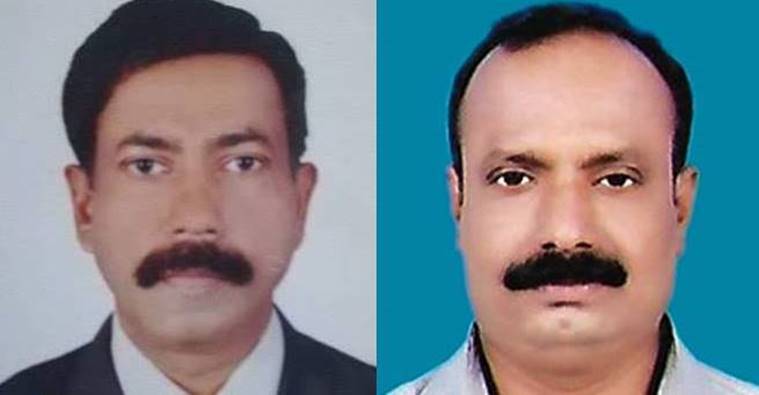 Ajayan M and Anoop Puthanpurayil, two expats from Kerala, who succumbed to Covid-19 in Kuwait.
Ajayan M and Anoop Puthanpurayil, two expats from Kerala, who succumbed to Covid-19 in Kuwait.
“Many of the hospital officials here know me very well because I’m an active social worker. For many years, I have worked closely with hospitals in settling cases of medical repatriation especially for those abandoned by their sponsors. So during Covid-19 too, I get calls from hospitals,” said Santhosh.
“Ajay-ettan would call me from the ICU sometimes. I tell the doctors that I am his brother so they would let me talk to him. On the morning of May 26, around 9 am, I phoned him, but they asked to call a bit later. When I called again at 10:35 am, I was told that he died five minutes ago,” he added.
The next day, at the massive Sulaibiya graveyard where people dying from Covid and non-Covid illnesses are interred together, Santhosh watched as a couple of health workers lowered his friend’s body, wrapped in plastic, into a six-feet deep grave. There were no family or friends around. He paid his respects by throwing a handful of dirt over his grave. A couple of rows away, he noticed that Anoop was also laid to rest.
“That night, I was too scared to sleep. I felt a sort of congestion on my chest, as though I had the infection too. I took some antibiotics and after a while, it went away.”
In the Gulf, where an estimated 1.9 million Malayalis live and work with a majority of them staying without their families, the past four months of the coronavirus pandemic have been a deeply traumatic chapter of their lives. If the initial months were spent battling fears of the virus and how to dodge death, later on, they were subsumed by acute joblessness, economic uncertainty and dread of dying by starvation. For many of them, being locked up in rooms under a tight curfew without a family support system, meant a spike in mental health issues like depression, anxiety and suicidal tendencies.
Although there’s no data on the number of Malayalis who have tested positive so far, statistics show over 270 of them have succumbed to the virus since February in the six Gulf countries of UAE, Saudi Arabia, Qatar, Kuwait, Oman and Bahrain. The death toll, in contrast to Kerala where only 23 have died as of June 30 in a 3.5 crore population, has been a subject of great debate.
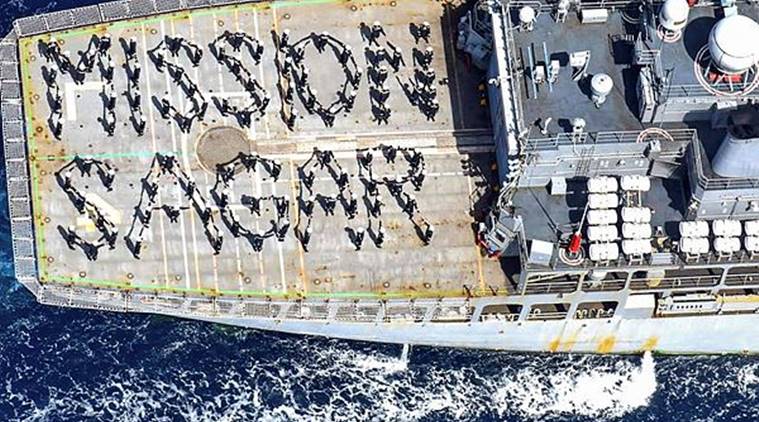 Indian Naval Ship Kesari arrives at a port after 55 days of deployment to the Southern Indian Ocean region as part of ‘Mission Sagar, in Kochi. (PTI)
Indian Naval Ship Kesari arrives at a port after 55 days of deployment to the Southern Indian Ocean region as part of ‘Mission Sagar, in Kochi. (PTI)
While some say the mortality rate is routine in keeping with the high testing and infection spread in GCC countries, there are others who contend that valuable lives could have been saved if they were repatriated by flights early on. There’s also the question of the efficacy of the limited health facilities in those countries which are originally designed for their own native populations. Or the inability of the large, financially-stunted, blue-collar workforce in accessing private healthcare. While these problems have long plagued the lives of Malayali expats in the Gulf, a pandemic has certainly brought out the worst effects.
But there’s no denying that for thousands of them today, their ‘naadu’, or home state of Kerala, right now appears a far safer and attractive place to be. They left their hometowns behind in search of better economic opportunities in the glittering cities of the Gulf, but for many, the pandemic has prodded them to think if such journeys are now worth it. After all, to die far away from home, alone in a hospital bed, is inexplicable.
***
Radhakrishnan, who ran a dance institute in Bahrain for 20 years, was among the first wave of passengers on the Vande Bharat repatriation flights in the second week of May. In February, when the virus began spreading from China to Europe and the Middle East, the administration in Bahrain ordered immediate shutdown of private non-essential institutes like his dance school and advocated social distancing measures.
“There was a deep sense of fear among the expats. Indian families, in particular, stopped going out, except to get groceries or food. People couldn’t move anywhere without permission. I think the lockdown was implemented a bit late because local transmission, by then, was already happening,” said Radhakrishnan, a native of Kozhikode district.
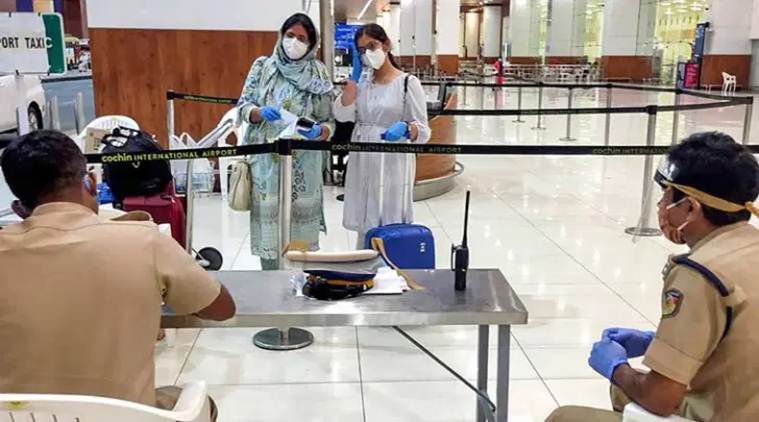 Passengers arrive from Dubai by an Air India flight at Kochi International Airport. (PTI/File)
Passengers arrive from Dubai by an Air India flight at Kochi International Airport. (PTI/File)
As the curfew fell into place, the Malayali expats, especially businessmen and blue-collar workers who don’t have a regular flow of income, were severely hit. Savings accounts began to dry up fast and remittances crashed like never before. Layoffs followed in the formal economy.
If the financial insecurity was one problem, trying to stay out of the way of the virus was another. Several people that indianexpress.com spoke to agreed that while testing and treatment across the GCC countries were accessible to all in the initial weeks of the pandemic, gradually as hospitals became overwhelmed, getting a bed or a test proved to be a huge challenge. Only in the cases of severely-ill persons, with breathlessness or pneumonia like symptoms, were health officials sympathetic. In any case, the health infrastructure in these countries are not decentralised as it is in Kerala. It has always been structured to cater to a small section of the population at a time.
“Authorities had set up separate facilities for quarantine and treatment, but when the inflow of patients increased, naturally the facilities fell short. My brother’s son was infected in Dubai, reportedly from another Malayali who hid it. He got admission at a hospital after three days of the test results,” said Xaviour Antony, who works with a private IT firm in Kuwait.
“Here in Kuwait too, only the serious suspected cases are being tested right now. The rest are told to stay at home despite symptoms.”
Quarantining at home for those with mild or moderate symptoms is usually recommended to reduce the strain on hospital resources so that the deserving cases with serious morbidity can get access to a bed. But for many expats, especially in the blue-collar segment, quarantine is impossible because they live in highly congested labour camps and apartments with three or more people in a room.
In fact, expats underline that a prime reason why so many of them have tested positive for the virus is precisely due to the living arrangements.
“How can you isolate if there are 10-12 people in a flat? One room has one washroom and there’s a time-table for use by the occupants starting from early morning. The infection is bound to spread,” said Muneer Kumble, a social worker in Dubai.
An engineer in Oman, who returned to Kerala recently after the projects he was handling were put on hold, quipped, “It’s like being a sacrificial goat. You don’t know when your turn will come. So you wait and live in fear.”
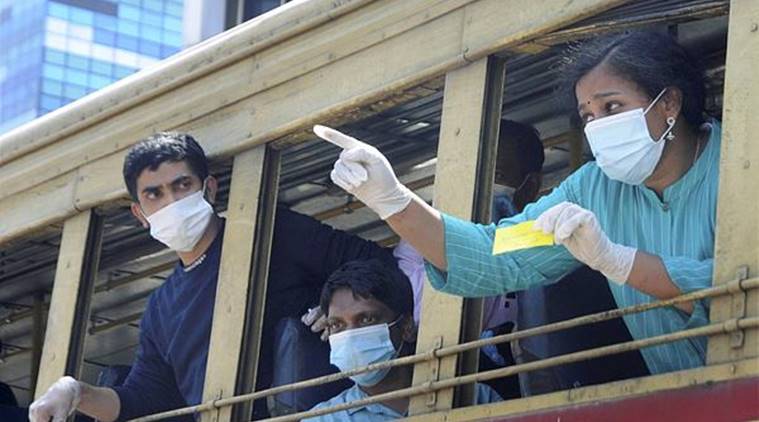 NRIs from various gulf countries who arrived at Kannur airport protest against the state government for not providing them a quarantine facility, at Moffusil Bus Stand in Kozhikode. (PTI)
NRIs from various gulf countries who arrived at Kannur airport protest against the state government for not providing them a quarantine facility, at Moffusil Bus Stand in Kozhikode. (PTI)
***
On the WhatsApp group of Great Revolution against Injustice (GRI), a global community of Malayalis engaged in social service based on WhatsApp, the voice messages come in at regular intervals, one after the other.
One said, “A 60-year-old person needs some BP tablets immediately. He’s been trying to source it from Kerala, but has had no luck. Can someone help?”
Another responded to it, “Yes, this has been a problem. Maybe we can all chime in with whatever money we have and help him. Let me know.”
A third message popped in. “There are three seats available on a Sharjah-Kochi flight for AED 1075 each. If there are any takers, let us know.”
In between these voice clips on WhatsApp and beyond, the needs of many expats in the Gulf, who have been economically impacted by the pandemic, are being met. Food kits. Medicines. Ambulances. Blood donation. Airline seats. Job openings. Quarantine spaces. Mental counselling. You name it and they are being taken care of, courtesy the large network of online and offline voluntary organisations spread across the Gulf. In places where governments, police and embassies have failed to reach, the gaps have been duly plugged by the volunteers.
Many of these organisations have historically been present in the Gulf since the 70s when the process of migration started, some as an expatriate wing of leading political parties in Kerala and others as social and cultural spaces. For lakhs of people leading a ‘bachelor’ life in the Gulf, such organisations, during good times and bad, have fostered a sense of solidarity.
Thameem is the president of the Gulf wing of the GRI WhatsApp group and runs a garment shop in Bengaluru, coordinating activities from there. Every few hours, he scans the group chat, making sure the tasks are completed, constantly adding others to expand the network.
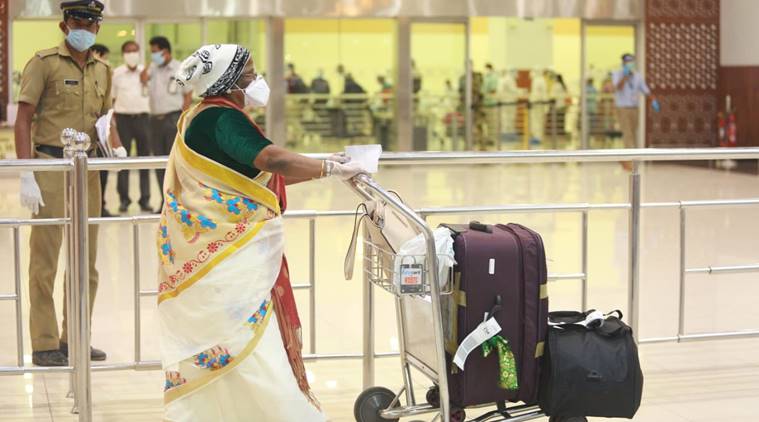 A passenger at Cochin airport arriving from Abu Dhabi. (Source: PRD, Gov of Kerala)
A passenger at Cochin airport arriving from Abu Dhabi. (Source: PRD, Gov of Kerala)
“Many of our people are alone in the Gulf, far away from their families. At a time like this, they need our help. That’s why we are working round-the-clock to cater to their needs. Through sponsors, we arrange flight tickets for those who can’t afford them. We distribute food kits and medicines and we have a parallel group where we post openings of jobs,” he said, over the phone.
There’s also a personal side to Thameem’s volunteering efforts. In April, he lost his elder brother to Covid-19 in Dubai at the age of 48. Ahmad Kabeer, who worked in an advocates’ office and was active in the social service space in the city, was hospitalised after he complained of fever and breathlessness. With his diabetes complicating matters, his condition turned critical and after a 15-day battle in the hospital, he passed away on April 21, leaving behind his wife and four children.
“He hadn’t seen his youngest child who was born in March. What happened to my brother should never happen to anyone else. My brother used to do these volunteer jobs. I miss him so much. His death motivates us all to work harder and reach those in need,” said Thameem, adding that his brother’s number is still added to the WhatsApp group in his memory.
“I still believe he’s there.”
***
In the 2017 Malayalam film ‘Take Off’, which told the real-life story of the evacuation of a bunch of Malayali nurses from ISIS-controlled Iraq, there’s a riveting scene in which the Indian ambassador, played by Fahadh Faazil, asks a nurse, played by Parvathy Thiruvothu, why people like her were ready to travel to conflict-prone regions despite getting jobs back in the country.
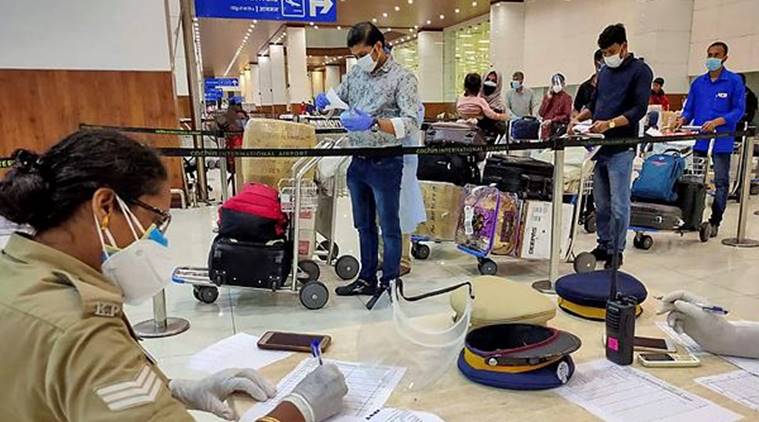 Passengers arrive from Jeddah via Air India flight at Kochi International Airport. (PTI)
Passengers arrive from Jeddah via Air India flight at Kochi International Airport. (PTI)
Her response was, “Do you know the kind of salaries we get back home? Our families educate us by taking loans and borrowing money. We may get those jobs, but with the salaries we earn, we can’t even pay off the interest. Not just me, every nurse who comes here, goes through such conditions. We may be called angels, but no one comes to inquire how our homes are run.”
The immediate context of the film may have been the condition of nurses in Kerala and the reasons prompting them to migrate abroad, but on closer inspection, there are parallels to the overall trend of the state’s Middle-East migration and the future it holds for the people.
Since the 70s, major cities in the Gulf including Dubai, Riyadh and Doha have grown on the pillars of expatriate labour, chiefly by Malayalis, and in return, the remittances they sent home powered Kerala’s development and social indicators. However, studies have shown that a combination of factors such as drop in oil prices, naturalisation policies like Nitaqat in Saudi Arabia and competition from workers of countries like Nepal, Sri Lanka and Bangladesh have taken the sheen off the average Malayali’s dream to work in the Gulf.
So then the question arises: what’s the incentive for the Malayali to continue working in the Gulf? In the backdrop of the pandemic, would economic reasons still trump a safer and healthier life back home?
Dr Arif, a consultant ENT surgeon at the Sultan Qaboos University Hospital in Oman and a member of the Indian Medical Association (IMA) there, noted, “Most expats in Gulf countries are in a disassociated situation. They are not coming here for education or quality of life. They are coming here because of debt, family responsibilities, securing education for kids etc… people here are not bothered about their health. They just continue working and their intention is to make money. And that’s justified because they want to secure the future of their families.”
Among many expats, Dr Arif stressed, lifestyle diseases like hypertension, diabetes, cholesterol are cropping up, especially in the younger age-group. Stress is seen as a prime concern which leads to hidden morbidities.
“In the absence of routine health check-ups, such morbidities are not getting detected. When the pandemic came, these factors got aggravated. So you have Covid on one hand and unemployment on the other. With families not present, they feel highly insecure,” he said.
For weeks now, Dr Arif and other doctors, in conjunction with voluntary organisations, have been providing guidance and counselling for those reporting symptoms of anxiety and depression. But the effects are long-term, they fear.
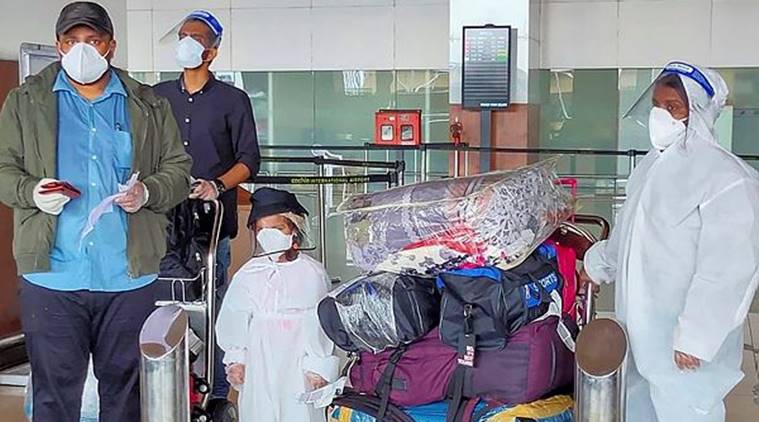 Passengers from various countries arrive via relief flights, at Cochin International Airport ( CIAL) in Kochi. (PTI)
Passengers from various countries arrive via relief flights, at Cochin International Airport ( CIAL) in Kochi. (PTI)
“People are not talking about Covid anymore, but about their own existence in life. We fear that a large section of the expatriates in the Gulf are going to have psychological issues,” he said.
Much of the stigma among expats is also to do with returning to their families and friends in Kerala, uncertain of how they would be welcomed. As long as they had a job with a steady income, the Malayali expat was always held in high esteem. But now, they are not so sure.
Biju P, who works in the sales team of a private firm in the UAE, concurs, “An expat will always be seen and treated as a cow that continues to give milk. He/she will do everything to support their family. I know many people here who are hanging on to dear life because they cannot think of returning home. So they try to sustain themselves through debt, loans and credit cards.”
The ones that do return are having to face ostracisation in several parts of Kerala. Last month in Malappuram district, a Gulf returnee was not allowed to enter his own home for quarantine by his family out of fear of Covid-19. For hours, he sat outside his house without even being provided water to drink before health workers shifted him to an institutional facility.
“A similar incident happened to a person I know in Ajman,” said Biju. “He came to me asking for a ticket to fly home because his mother passed away. So we got in touch with a travel team and arranged a ticket for him. But after he reached Kerala, he called me and started crying on the phone. He said his family conducted the last rites even before he could reach home.”
“They didn’t even inform him on the phone before completing the last rites. Everything was over by the time he arrived.”
Apr 19: Latest News
- 01
- 02
- 03
- 04
- 05






































